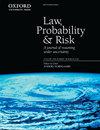Legal System Network Effects and Global Legal Development
IF 1.4
4区 社会学
Q1 LAW
引用次数: 0
Abstract
Law originates in local environments, yet can be transmitted globally or over time to new contexts and foreign or future users. At its origin, law arises in response to social needs, but once formalized it takes on a semantic life of its own in a network of users. A rule created in response to a random New York plaintiff could – with sufficient popularity – end up as the standard norm applied globally, regardless of underlying suitability for specific local needs. To better understand the consequence of these legal system network effects on global legal development, this paper applies Klausner’s network theory of law’s perceived value to use of foreign or transnational law in the international development context. Through this network analysis, the paper expands on Pistor’s examination of how local needs interact with standardized, international “best practices�?. With regard to law’s genesis in reaction to local environmental stimulus, the paper presents the leading theory on law generated in response to societal demand (Luhmann), but also shows the presence of similar views in Baker, Eisenberg and Glenn. This analysis brings law’s dual facets into focus: at law’s origin are systematic relationships in which societal needs stimulate the legal profession’s ordering of concepts and remedies. Once formalized, law then enjoys network effects by its users: the legal system’s concepts and remedies take value from their ability to be easily communicated and understood, becoming more valuable as the network’s user base grows. The logic of law’s network growth will tend to divorce it from attention to the disruptive stimulus of social needs. Because law as a network will become more attractive the more “settled�? (use over time) or “global�? (use over space) it becomes, change becomes undesirable. A bias in favor of well-networked law can insulate the legal system from the dynamic social responsiveness needed to retain congruence with social needs. Developing countries and law reform professionals should therefore keep in mind that although popular “fast law�? may hit the spot and please the budget, it is probably not the best way to nourish the body politic.法律制度、网络效应与全球法律发展
法律起源于当地环境,但可以在全球范围内或随着时间的推移传播给新的背景和外国或未来的用户。法律最初是为了回应社会需求而产生的,但一旦形式化,它就在用户网络中拥有了自己的语义生命。一项针对纽约某一随机原告而制定的规则,在足够受欢迎的情况下,最终可能成为全球适用的标准规范,而不考虑其是否适合当地的具体需求。为了更好地理解这些法律体系网络效应对全球法律发展的影响,本文将克劳斯纳关于法律感知价值的网络理论应用于在国际发展背景下使用外国或跨国法律。通过这种网络分析,本文扩展了皮斯托关于当地需求如何与标准化的国际“最佳实践”相互作用的研究。关于法律的起源是对当地环境刺激的反应,本文提出了关于法律产生于对社会需求的反应的主要理论(Luhmann),但也显示了Baker、Eisenberg和Glenn的类似观点。这种分析使法律的双重方面成为焦点:在法律的起源是系统的关系,其中社会需要刺激法律专业的概念和补救措施的排序。一旦形式化,法律就会因其用户而享受网络效应:法律体系的概念和补救措施因其易于沟通和理解的能力而获得价值,随着网络用户基础的增长而变得更有价值。法律网络增长的逻辑将倾向于使其脱离对社会需求的破坏性刺激的关注。因为法律作为一个网络,越“稳定”,就越有吸引力。(随时间使用)或“global”?(在空间上使用)它变得,改变变得不受欢迎。支持网络良好的法律的偏见会使法律体系与动态的社会反应隔绝开来,而社会反应是保持与社会需求一致所必需的。因此,发展中国家和法律改革专业人员应牢记,尽管流行“快法”?这可能正中要害,取悦预算,但可能不是滋养国家的最佳方式。
本文章由计算机程序翻译,如有差异,请以英文原文为准。
求助全文
约1分钟内获得全文
求助全文
来源期刊

Law Probability & Risk
MATHEMATICSSTATISTICS & PROBABILITY&-STATISTICS & PROBABILITY
CiteScore
2.10
自引率
28.60%
发文量
8
期刊介绍:
Law, Probability & Risk is a fully refereed journal which publishes papers dealing with topics on the interface of law and probabilistic reasoning. These are interpreted broadly to include aspects relevant to the interpretation of scientific evidence, the assessment of uncertainty and the assessment of risk. The readership includes academic lawyers, mathematicians, statisticians and social scientists with interests in quantitative reasoning.
The primary objective of the journal is to cover issues in law, which have a scientific element, with an emphasis on statistical and probabilistic issues and the assessment of risk.
Examples of topics which may be covered include communications law, computers and the law, environmental law, law and medicine, regulatory law for science and technology, identification problems (such as DNA but including other materials), sampling issues (drugs, computer pornography, fraud), offender profiling, credit scoring, risk assessment, the role of statistics and probability in drafting legislation, the assessment of competing theories of evidence (possibly with a view to forming an optimal combination of them). In addition, a whole new area is emerging in the application of computers to medicine and other safety-critical areas. New legislation is required to define the responsibility of computer experts who develop software for tackling these safety-critical problems.
 求助内容:
求助内容: 应助结果提醒方式:
应助结果提醒方式:


